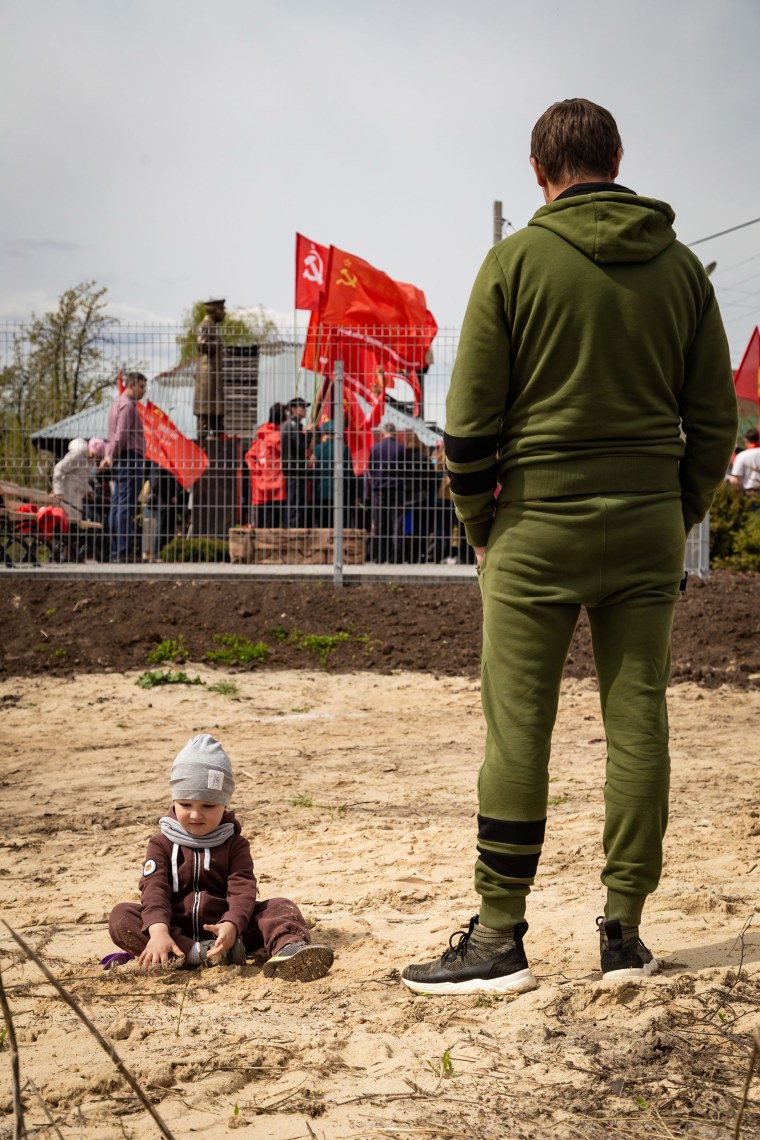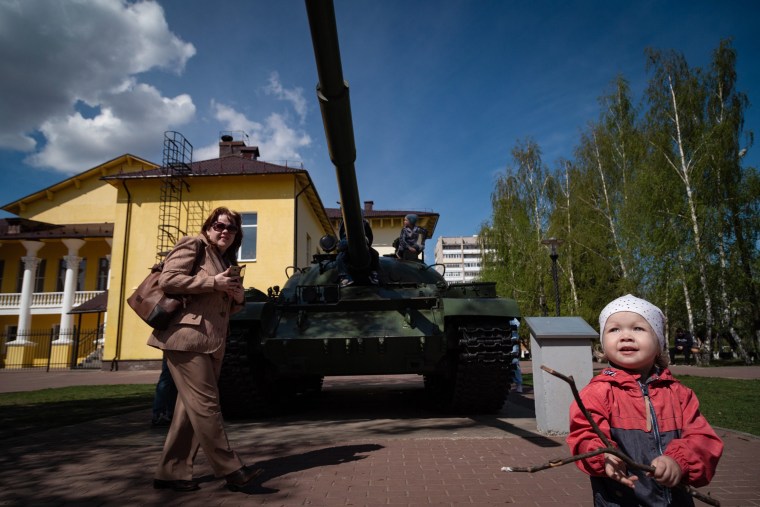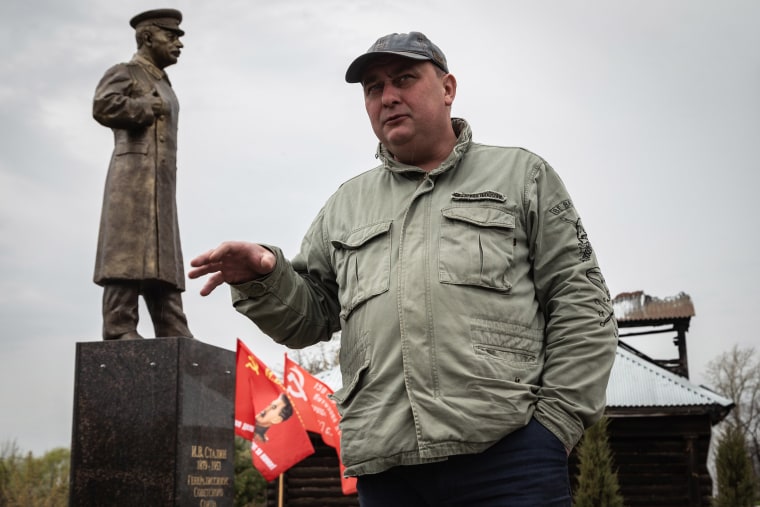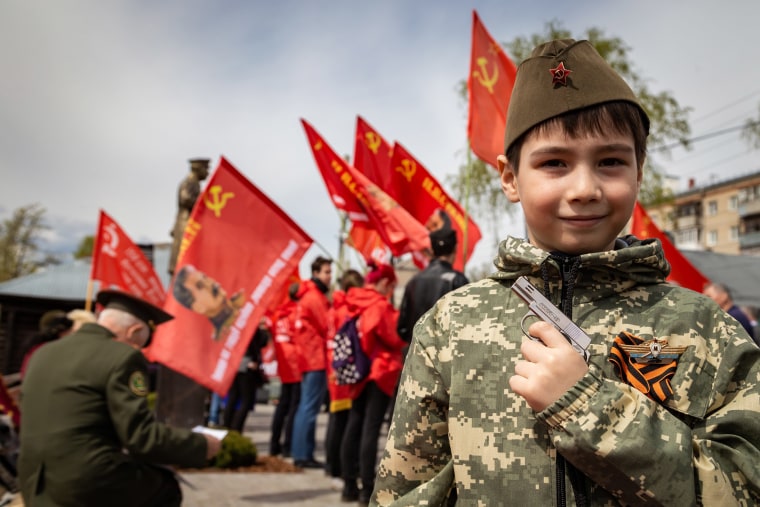BOR, Russia — A few dozen people crowded around a new monument to Josef Stalin in this provincial town in central Russia.
As local television news cameras rolled, admirers heaped praise on the late Soviet dictator, and the event’s organizers laid a concrete cornerstone to mark what will become the Stalin Center, a museum and educational center presenting a positive view of the creator of the gulag and the architect of Russia’s mass repressions in the mid-20th century.
“Stalin was the best master. He won the war and built the country from ruins,” Aleksey Zorov, 44, a local businessman who is the sponsor of the new center inaugurated May 8, told NBC News.
The public rehabilitation of Stalin’s image reflects the social and political tensions that have gripped Russia in recent months. To some, the memory of Stalin suggests an era of national greatness, and President Vladimir Putin has promoted Stalin’s image as a way to deflect criticism of his own leadership, as he grapples with falling approval ratings, a sluggish economy and accusations of corruption.
To others, however, Stalin represents an era of fear and repression that seems all-too familiar in Russia today. Putin’s government has cracked down harshly on pro-democracy protesters, as thousands of people have taken to the streets in support of the imprisoned opposition leader Alexei Navalny.

Zorov was 18 when he joined the Communist Party, which still enjoys strong support among local residents. The Stalin Сenter would remind state officials that “they must fight corruption at the top,” he said.
Under Stalin’s rule, approximately 1.7 million Soviet citizens were evicted from their homes and taken to forced labor camps. About 690,000 were executed. Yet in recent years, statues have been erected around the country celebrating the man as a national hero who defeated the Nazis and oversaw an era of modernization.
Opinion polls conducted by the Levada Center, an independent polling organization based in Moscow, have shown that approximately 70 percent of Russians approve of Stalin and his policies.
This has come as a shock to some Russians.
“I spent my life demolishing Stalin’s totalitarian system that killed hundreds of thousands, the core of Russia’s elite,” said Valery Borshchev, a former Soviet dissident who is now a human rights activist at the Moscow Helsinki Group, a Russian human rights organization.

By supporting the image of Stalin as a hero to the Russian people, however, Borshchev said that Putin, a veteran member of the KGB, the former Russian secret police and intelligence agency, and who served as director of its successor agency, the FSB, is working to rehabilitate the KGB’s image and dampen criticism of his own draconian crackdown on political dissent.
“Putin is pragmatic. He knows that Stalin was an executioner, but he needs him now to save his own political career,” Borshchev said.
Such efforts extend beyond Stalin. In Moscow, government prosecutors recently declared that the dismantling of a monument to Soviet intelligence chief Felix Dzerzhinsky was illegal. The statue had stood in front of the FSB’s headquarters on Lubyanka Square but was pulled down in 1991. Now, it may be resurrected in the place where it once stood.
For Putin’s opponents, such monuments to an era of brutal repression and mass surveillance symbolize the danger and state-sanctioned violence they face today.
Download the NBC News app for breaking news and politics
In recent weeks, police have raided the offices and homes of Navalny’s supporters.
Four editors of a Moscow student newspaper, DOXA, are currently facing up to three years in prison for “inciting” minors to join anti-government protests, which broke out in more than 100 Russian cities last winter.
Some organizers of pro-Navalny rallies have fled the country, while many who remained in Russia are now facing prosecution.
Moscow prosecutors are also seeking to disband Navalny’s nongovernmental group under a law against extremism. And Navalny, in prison, went on a three-week hunger strike that brought him close to death, his personal doctor said.
In Bor, Oleg Rodin, a 26-year-old lawyer, leads the local branch of Yabloko, the only liberal party registered in Russia. The current generation of political dissidents is having a tough time in the face of the crackdowns, he said, and the rehabilitation of Stalin has emphasized the need for Putin’s opponents to run for office themselves. Rodin said he is planning to seek election to the Duma in September.
“The return of Stalinism is terrifying,” he said. But most Stalinists are older, he said, and it is the younger generation that represents “Russia’s future.”
Yet, while Putin may be encouraging the rehabilitation of Stalin’s image in order to increase support for his own leadership, some of today’s Stalin supporters are openly critical of Putin, as well.
In Bor, as flags depicting Stalin’s mustachioed face flapped in the wind, speakers at the Stalin Center’s commemoration mocked today’s Kremlin as weak and subservient to Russia’s enemies, characterizing Putin’s hard-line foreign policy as not confrontational enough toward Western powers and criticizing him for the country’s current economic woes.
Putin is “an acrobat” trying to appease the conservative electorate while demonstrating sympathy toward his predecessor, Albert Karakhanyan, an activist with the local anarchist movement, said. Boris Yeltsin oversaw Russia’s transition away from the communist system following the fall of the Soviet Union, he added.
“Our crawling economic growth is a shame! Our population shrank by 670,000 last year. Five thousand businesses closed down in our region,” said Vladislav Yegorov, the first secretary of the Communist Party’s local branch. Russia’s oil-dependent economy went into recession during the Covid-19 pandemic last year, and millions of Russians have fallen below the poverty line.

Yegorov also cited ways in which Russia had been slighted on the international stage. “They kicked us out of Prague,” he said, referring to the Czech Republic’s recent decision to expel dozens of Russian diplomats following a report from its intelligence service that the Kremlin was behind a deadly explosion at a Czech ammunition depot in 2014. “Stalin would never allow this.”
“Stalin, wake up!” an old man in the crowd yelled, as if addressing the statue.
Zorov, the center’s sponsor, was equally critical. “Putin is falling behind,” he told NBC News. “Our authorities are scared of even the dead Stalin. All they can do is rob people.”
In Russia’s current political climate, such criticism of Putin often leads to arrests. But at the ceremony for the Stalin Center, only one man was detained: Andrei Sorochkin, a local liberal opposition activist who staged a protest at the event, holding up a banner that pointed out Stalin’s atrocities.
“Only a moral freak can worship such a monster,” the banner read.
Police later released Sorochkin after a brief interrogation. It was the 10th time he had been taken into custody over the last couple of years, he said.
To him, the links between the current moment and the earlier era of political repression are unmistakable.
“Police grab every single protester, give prison terms for a repost on social media,” and now the Russian authorities are banning Navalny’s movement as extremist, he said.
Even without the statues exalting Stalin, he felt as if the notorious leader had already returned. Under Putin, he said, it was as if he were witnessing “the bloody dictator’s reincarnation.”
